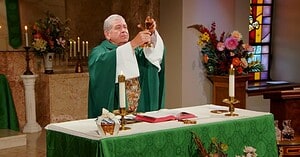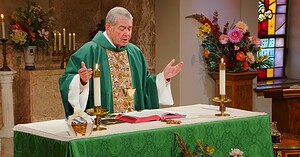Twenty-Ninth Sunday in Ordinary Time
Homily Video
Twenty-Ninth Sunday in Ordinary Time Homily Transcript
Okay, we hear about the Amalekites. The Amalekites in the First Reading—this is a battle that the Israelites are fighting. Amalek—okay, a little history here. All the way back, we know about Abraham. Abraham is the Father of Israel. Then he has Isaac, his son, and Isaac has Jacob and Esau.
Esau was the older son, and he was the one who should have received the inheritance or the birthright from Isaac. So it should have gone Abraham → Isaac → Esau. But the problem was Esau sold his birthright. Long story short, he sells his birthright to his younger brother Jacob. But really, Jacob tricks Esau into doing this, and then tricks his father Isaac into giving him the birthright.
Esau comes home hungry one day, and Jacob has food prepared. Esau doesn’t care much about the birthright or being the leader of Israel, so he says to Jacob, “Give me that food, and I’ll sell you my birthright.” Jacob takes him up on the offer.
Later, Esau realizes what he’s done—a foolish decision. He’s lost everything and regrets it. He tries to tell Jacob, “I’m the older brother. I made a mistake. Give it back to me.” But Jacob says, “No, it’s too late. I’m the heir now.”
So Esau is forgotten, cast off, and bitter. A feud forms between Esau and Israel. Esau’s grandson is Amalek. So the Amalekites, Amalek’s descendants, have a long-standing grudge against the Israelites. It’s in their lineage, in their DNA.
This becomes a major issue when Israel returns from slavery in Egypt back to the Promised Land. The Amalekites, who had been dwelling in Israel for 500 years while Israel was in Egypt, constantly attack the Israelites.
So God tells Moses—and later Saul and David—“Get rid of the Amalekites.” They become symbolic of bitterness and hatred.
This battle that Moses—or rather Joshua, Moses’ successor—is fighting is against the Amalekites. In this battle, Moses is on the mountain. As long as Moses’ arms are raised, the Israelites are successful. When he lowers them, they begin losing. Aaron and Hur, Moses’ assistants, one on each side, hold up his arms. When his arms are raised toward Heaven, they are victorious.
Fast forward: who else will have His arms raised? Jesus Christ on the Cross. Arms raised high—when Christ is dying on the Cross, with the two thieves on either side of Him—in a way, holding up His arms—and at the foot of the Cross are John and Mary, His Mother, supporting Him in His Sacrifice.
When Jesus is dying on the Cross in that position, Amalek—the symbol of sin and hatred—is once again defeated, and the new nation of Israel is victorious.
Okay, so we’re the new wave of Christians. We have things that make us weary. Amalek is always trying to attack us, trying to discourage us, to get in between us and God. And so it’s for us to raise our arms up. Okay, not literally necessarily, but you’re lifting your hands up to God in prayer. You say, “Lord, please, please come and deliver me. Save me.” And know that when your arms get tired, it’s going to be the Saints and the Sacraments underneath you lifting you up so that God can carry you to the Promised Land. Amen.
Readings
Featured Text
Discover More
Sixth Sunday in Ordinary Time
February 15, 2026
Fifth Sunday in Ordinary Time
February 8, 2026
Fourth Sunday in Ordinary Time
February 1, 2026
Request Sunday Mass Guide
The Sunday Mass Guide sent to your home address
Spiritual nourishment and updates from the Sunday Mass community
Monthly reflections from Fr. Scott Donahue, our Principal Celebrant


